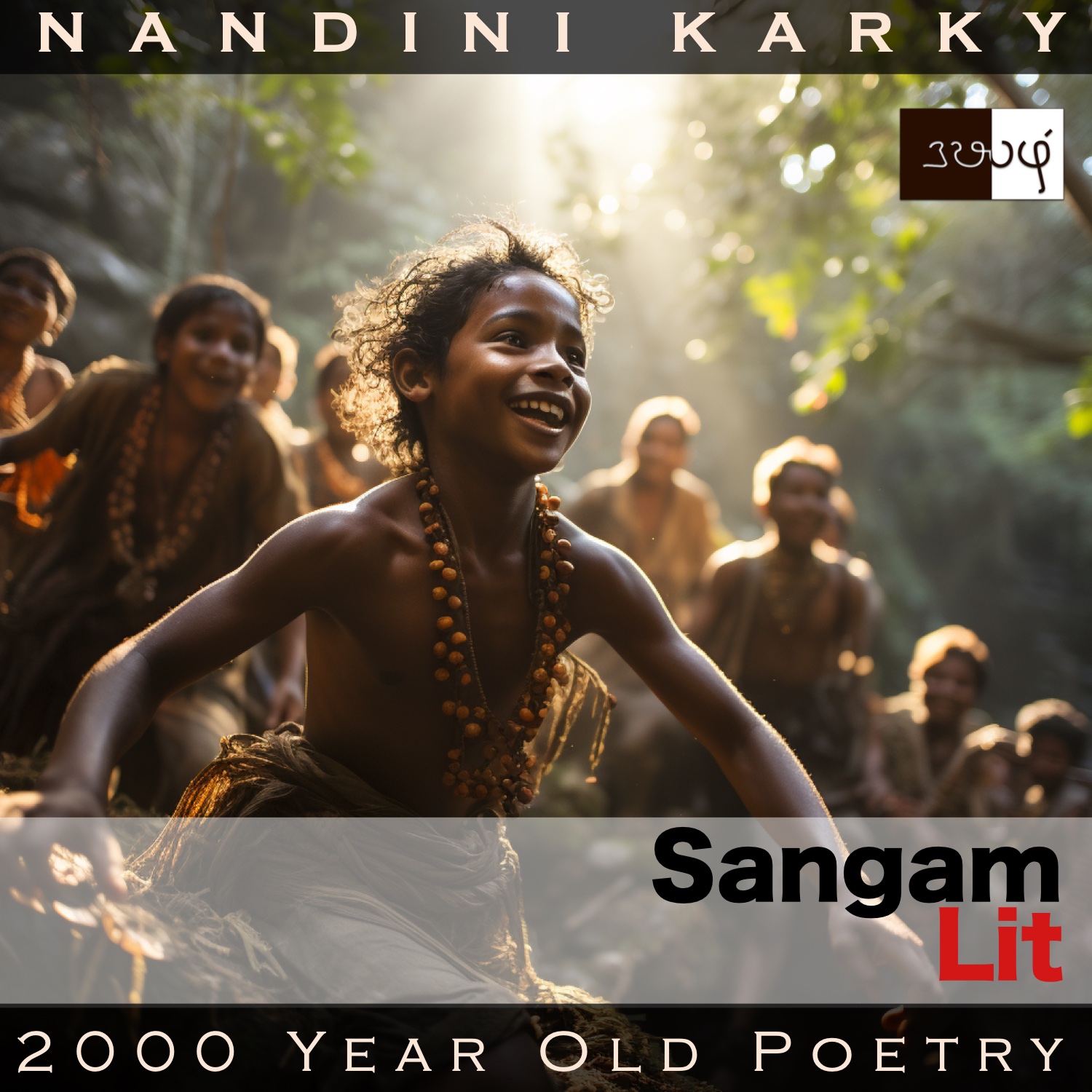Podcast: Play in new window | Download
Subscribe: Apple Podcasts | Spotify | Amazon Music | Android | iHeartRadio | TuneIn | RSS | More
In this episode, we perceive nostalgia about the past, as portrayed in Sangam Literary work, Puranaanooru 243, penned by the poet Thodithalai Vizhuthandinaar. Set in the category of ‘Pothuviyal Thinai’ or ‘Common Themes’, the verse contrasts two different stages of life.

இனி நினைந்து இரக்கம் ஆகின்று: திணி மணல்
செய்வுறு பாவைக்குக் கொய் பூத் தைஇ,
தண் கயம் ஆடும் மகளிரொடு கை பிணைந்து,
தழுவுவழித் தழீஇ, தூங்குவழித் தூங்கி,
மறை எனல் அறியா மாயம் இல் ஆயமொடு
உயர் சினை மருதத் துறை உறத் தாழ்ந்து,
நீர் நணிப் படி கோடு ஏறி, சீர் மிக,
கரையவர் மருள, திரைஅகம் பிதிர,
நெடு நீர்க் குட்டத்துத் துடுமெனப் பாய்ந்து,
குளித்து மணல் கொண்ட கல்லா இளமை
அளிதோதானே! யாண்டு உண்டு கொல்லோ
தொடித் தலை விழுத் தண்டு ஊன்றி, நடுக்குற்று,
இரும் இடை மிடைந்த சில சொல்
பெரு மூதாளரேம் ஆகிய எமக்கே?
A refreshingly different song from the series of elegies we have recently encountered. The poet’s words can be translated as follows:
“When I recollect, I pity myself; Back then, after adorning the firm mud dolls they made with plucked flowers, young maiden used to play in the moist ponds. Holding hands with them, we would embrace when they embraced and sway when they swayed. Having nothing to hide, along with friends lacking malice, we would go near a tall-branched ‘marutham’ tree, which was bending over a river shore, and then climb up a branch there, and elegantly, shocking every one on the shore, making waves splash high above, we would leap into the deep-watered pond suddenly, and then diving down, we would arise to the surface with a fistful of sand. That was the youth of innocence! Pitiable, isn’t it, when you compare that life with that of this old man, who has to walk with a quiver, leaning on a ring-capped walking stick, and cough every time after a few words have been uttered?”
Time to go deeper into these words. The poet starts with a bleak statement about pity rising in him when he remembers something. He goes on to elaborate on that something by sketching a scene where young girls are making dolls out of firm mud and then decorating these dolls with the flowers they plucked. Once this vital job is done, then these maiden relax by playing in the ponds. At this time, boys would join with these maiden and hold their hands, hug them and sway with them in a dance, the poet adds. He knows because he was one of those boys himself! Then, he talks about his friends, describing them as such open souls having no cunning in them. He remembers how these boys used to climb on the branch of a ‘Marutham’ tree, close to the pond’s shore and then would leap suddenly from that branch into the deep waters of the pool, startling every one on the shore, and making waves splash up noisily. They would then come up to the surface, punching a fistful of sand to the sky!
Isn’t that a picture-perfect capture of the innocent celebration of youth? Following those vivid descriptions that would make anyone smile, the poet goes on to talk about his present state, wherein he finds himself an old man, who has to rely on a walking stick even to take a few steps and then finds himself coughing every few words he speaks! Those legs that used to leap during adventurous feats now tremble in every day effort and those vocal chords that sang and shouted now coughs and stutters, the poet concludes.
Whenever I used to read in ‘Aham’ poems about young girls chasing parrots or playing with mud dolls, I used to wonder what the young boys were doing then because there was no mention of them anywhere. So happy to receive an answer to that question from another Sangam poem! With unforgettable visual and auditory imagery, the poet brings alive the fun-filled time of his younger days. This Sangam verse, reminded me of a poem I chanced across, when helping my son in preparing for his exams, one called ‘I remember, I remember’, written in the 1800s by Thomas Hood. It’s this exact contrast between the health and vitality of youth and the decay and disease of aging that this English poet brings out in his poem. These two poets are separated by two thousand years, a different language, a different culture, and yet, it’s fascinating to see how their emotion is exactly the same timeless and universal feeling of age yearning for youth that is long lost!




Share your thoughts...